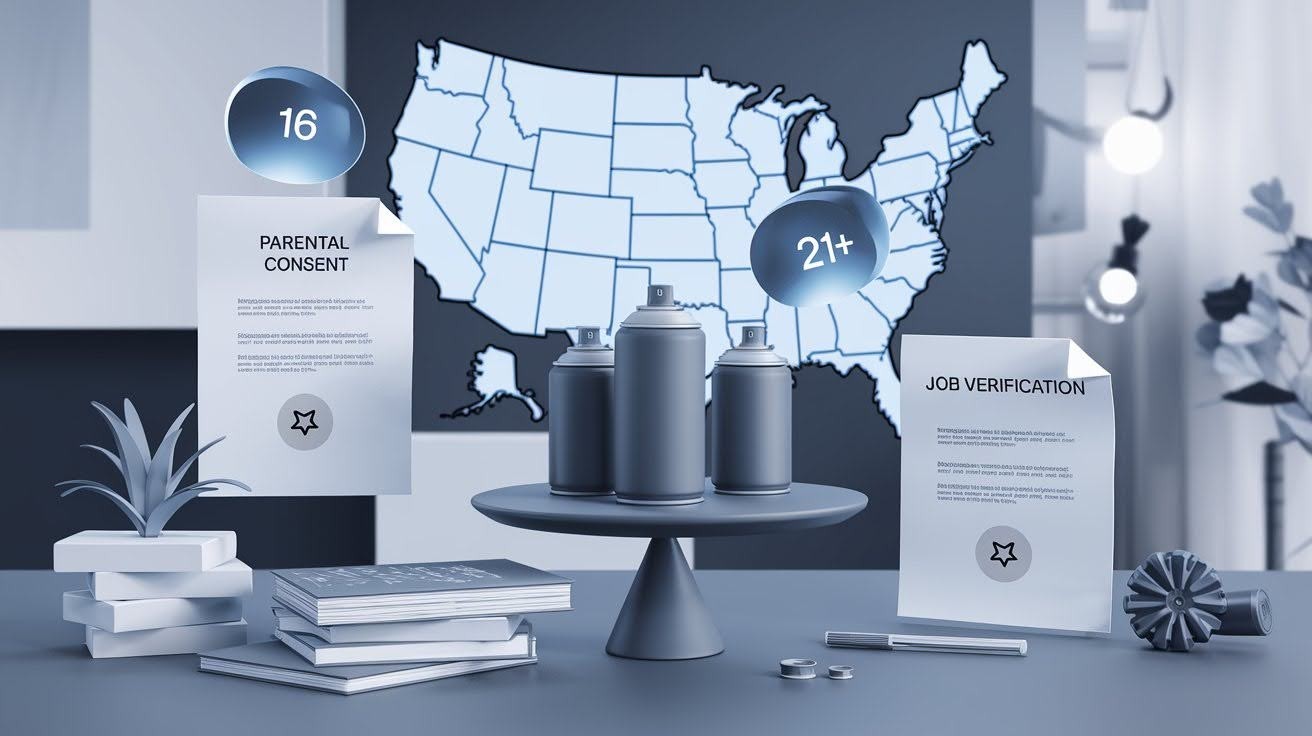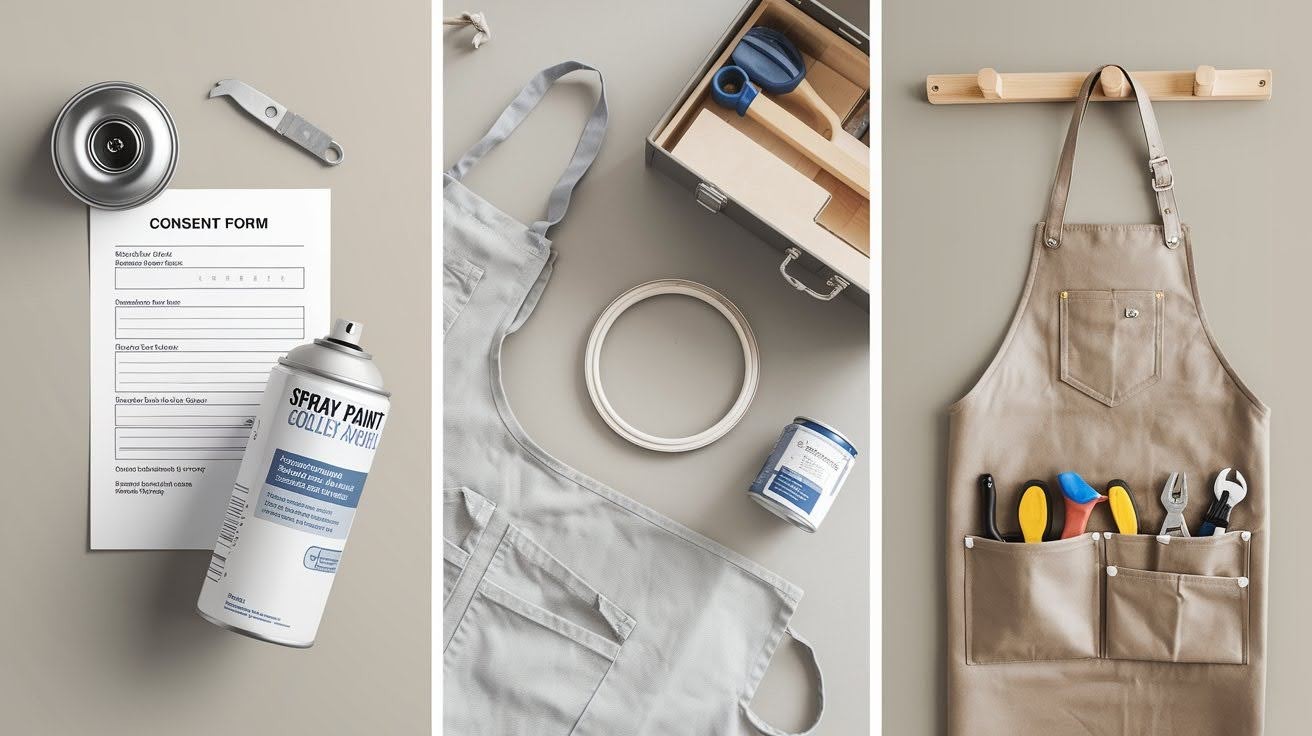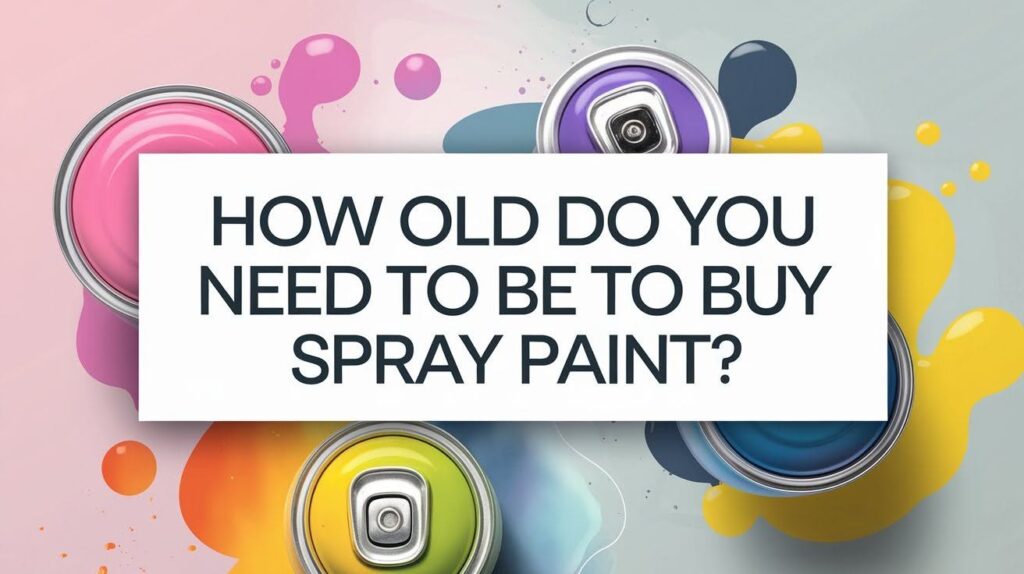As someone who’s worked in retail for over fifteen years, I’ve witnessed countless confused customers, both teens and parents, trying to understand spray paint age restrictions.
These rules exist primarily to prevent vandalism and protect young people from inhaling harmful fumes, but the actual requirements often surprise people.
Many assume there’s a universal age limit across the country, but that’s simply not true. What I’ve learned through experience is that spray paint regulations vary significantly depending on where you live.
Federal laws provide basic guidelines, but individual states and even local municipalities can impose their own stricter requirements.
This patchwork of regulations means a 16-year-old might legally purchase spray paint in one city but be turned away at the store across town. Understanding these differences can save you time, frustration, and embarrassing checkout moments.
Why Spray Paint Has Age Restrictions

Having seen the impact of graffiti vandalism in my community, I understand why these age limits exist. Spray paint damage costs property owners thousands annually, and many incidents involve minors who don’t realize the serious legal consequences they face.
These restrictions protect both communities and young people. I’ve watched teenagers end up in juvenile court for what they thought was harmless tagging, leaving parents responsible for cleanup costs and fines.
The laws recognize that teens sometimes make impulsive decisions and create barriers that encourage them to think first.
It’s not about limiting creativity, it’s about protecting property rights while keeping kids from making choices that could hurt their futures. These simple age requirements help channel youthful energy in positive directions instead of costly legal troubles.
General Age Requirements in the U.S.

Most Common Age Limit
In my experience helping customers across different states, 18 is the magic number you’ll encounter most often. This age requirement applies in the majority of states, though I’ve noticed some areas allow younger buyers with written parental consent.
The key is having that documentation ready; verbal permission usually isn’t enough.
Higher Age Limits
Some retailers have surprised me by setting their 21-year-old minimum, even when state law allows 18. This often reflects corporate policy rather than legal requirements.
I’ve seen major chains implement these stricter rules to avoid any potential liability issues, so don’t be shocked if you encounter this at certain stores.
Lower Age Limits in Specific Circumstances
Certain jurisdictions recognize legitimate work needs and allow 16-year-olds to purchase spray paint for employment purposes. However, this typically requires written guardian permission and sometimes proof of job necessity.
I’ve helped young apprentices and part-time workers navigate these requirements-the paperwork is worth it when spray paint is essential for their responsibilities.
State-by-State Age Rules
After researching regulations nationwide, I’ve found that spray paint age requirements fall into three main categories across the U.S.
State Minimum Age Overview
Most states require buyers to be 18 years old, including California, New York, and Texas. Some states allow 16-year-olds to purchase with restrictions, while others have no specific legal age limit. What complicates things is that local cities can impose stricter rules than their state requires.
Store Discretion States
In states without legal minimums, retailers set their policies. I’ve seen stores in the same area with completely different age requirements, one selling to 16-year-olds while another demands 21.
These decisions often reflect corporate policies or insurance requirements rather than laws. Always call ahead to avoid checkout surprises.
Penalties for Illegal Purchase or Possession

For Minors
I’ve seen firsthand how serious these violations can become for young people caught breaking spray paint laws. Fines typically range from $50 to $500, depending on your location, which might not sound like much until you’re a teenager with limited income.
What impacts families is when cases go to juvenile court. I’ve watched parents navigate court dates, legal fees, and mandated community service hours that disrupt school and work schedules.
For Sellers
Store owners and managers face consequences when employees sell to underage buyers. Business fines can reach thousands of dollars per violation, and repeat offenses may result in license suspensions or increased scrutiny from local authorities.
This is why most retailers train staff extensively on ID checking and age verification procedures; the financial risk is simply too high to leave things to chance.
How Retail Policies Can Differ From Law

Working with various retailers over the years, I’ve noticed that many stores set age limits higher than what the law requires. While your state might allow 18-year-olds to buy spray paint, don’t be surprised if major chains like Home Depot or Walmart require customers to be 21.
This isn’t about being difficult, it’s smart business. I’ve spoken with store managers who explain that stricter policies help them avoid liability issues and reduce the risk of selling to someone who might use the product inappropriately.
Corporate chains also find it easier to maintain one consistent policy across all locations rather than training employees on different state laws.
From their perspective, it’s better to occasionally turn away a legal buyer than face potential fines, lawsuits, or negative publicity from underage sales that lead to vandalism incidents.
Tips for Buying Spray Paint Legally
- Research your local regulations first: State laws are just the starting point, your city or county might have additional restrictions. A quick online search or call to your local government office can save you time and prevent checkout surprises.
- Always bring valid identification: Even if you look older, stores require photo ID for age verification. Driver’s licenses, state IDs, or passports work best. I’ve seen too many frustrated customers turned away because they forgot their wallets.
- Get written parental permission when needed: If you’re under 18 and your area allows parental consent, make sure it’s in writing. Verbal permission won’t cut it, stores need documentation to protect themselves legally.
- Call the store ahead of time: Since retailer policies can be stricter than state laws, a quick phone call can confirm their specific age requirements and save you a wasted trip.
Conclusion
After years of witnessing both successful purchases and checkout disappointments, I can tell you that understanding spray paint age requirements saves everyone time and frustration. Most states require buyers to be 18, though some retailers set their 21-year minimum, so always check before you shop.
I’ve seen the positive impact when people channel their creativity into legitimate projects, home improvements, art, and restoration work that benefits communities rather than harming them.
By respecting age requirements and using spray paint appropriately, you’re contributing to safer neighborhoods while avoiding fines that nobody wants to pay. Smart shopping and responsible use benefit everyone involved.
Frequently Asked Questions
Can I buy spray paint at 16 with my parent present?
In most states, physical presence of a parent isn’t enough – you typically need written consent or must wait until you’re 18. Some jurisdictions do allow parental accompaniment, but it’s safer to check your local laws first.
Do all stores have the same age requirements for spray paint?
No, individual retailers can set stricter policies than what state law requires. While your state might allow 18-year-olds to purchase, some chains require customers to be 21 regardless of local regulations.
What happens if I’m caught using spray paint illegally as a minor?
You could face fines ranging from $50-$500, mandatory community service, or juvenile court proceedings. Parents often become financially responsible for cleanup costs and property damage caused by illegal tagging.
Can I buy spray paint online if I’m under the legal age in stores?
Online retailers follow the same age verification requirements as physical stores. Many require age confirmation during checkout or upon delivery, so being underage won’t help you bypass these restrictions.
Are there different rules for different types of spray paint?
Most age restrictions apply to all aerosol paints regardless of intended use – whether it’s automotive, craft, or general purpose. The laws focus on the delivery method and potential for misuse rather than the specific paint type.

